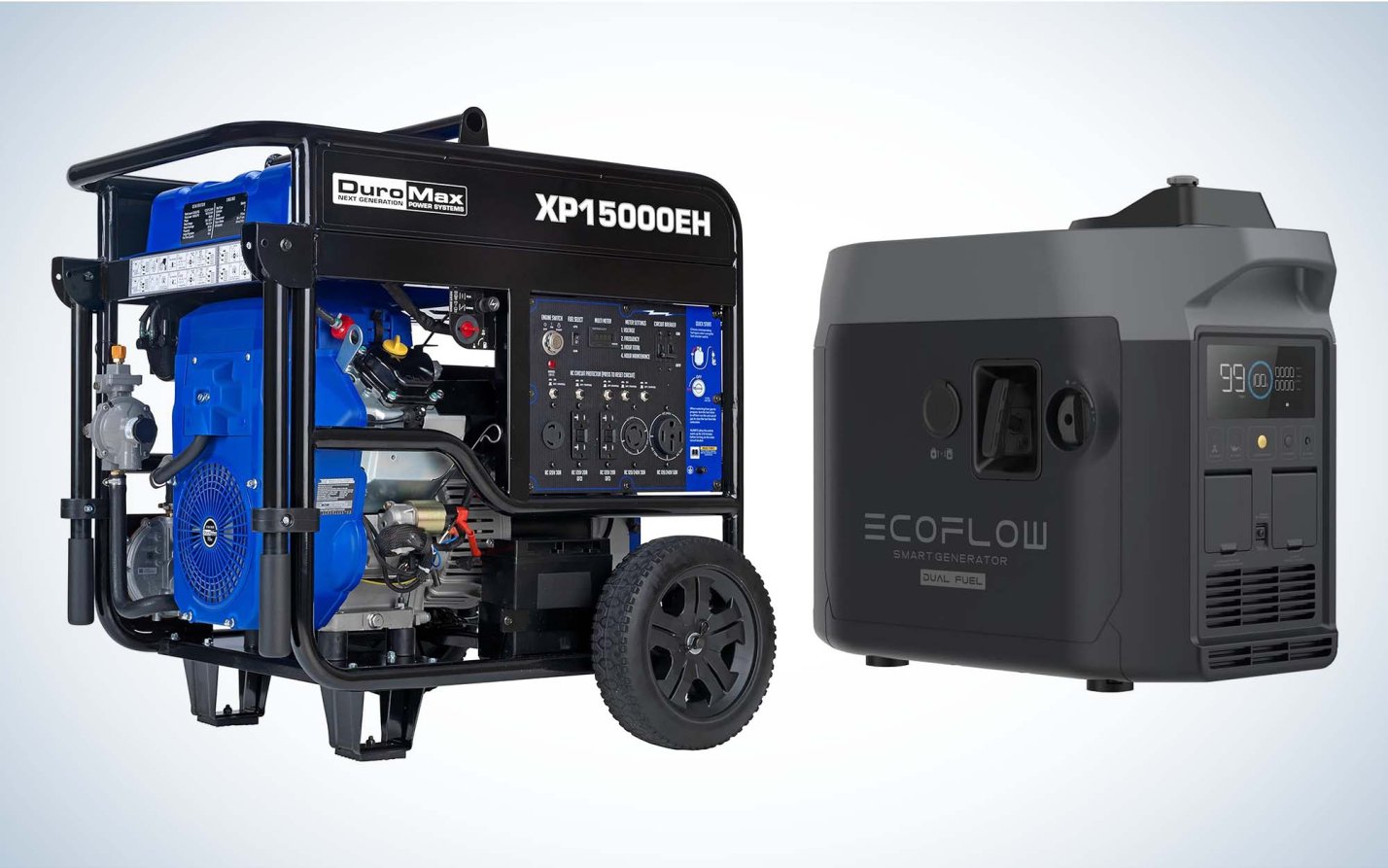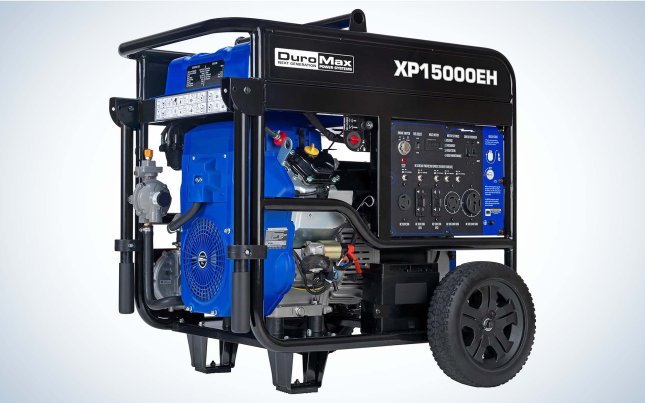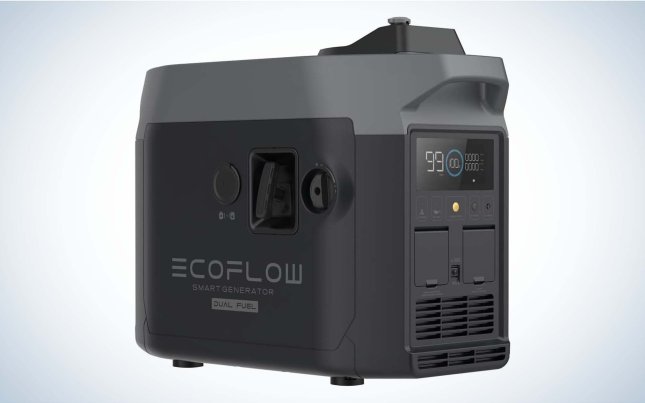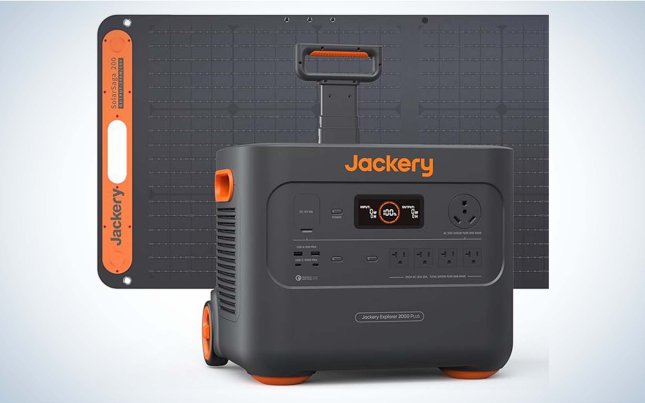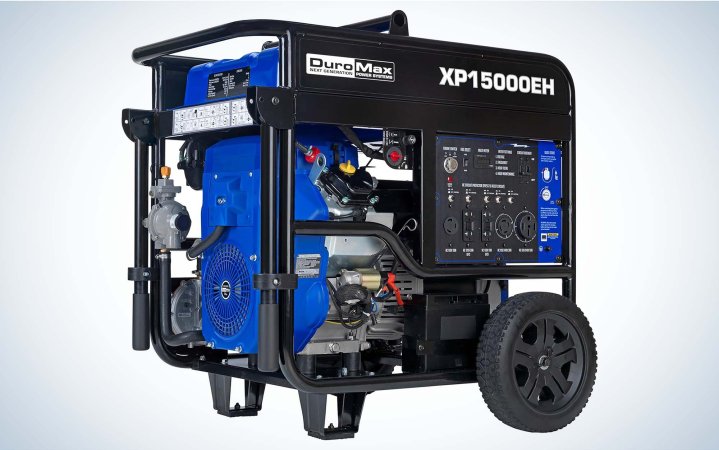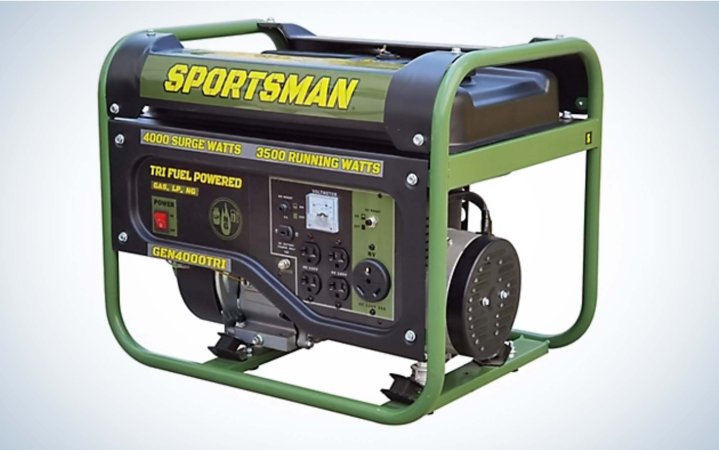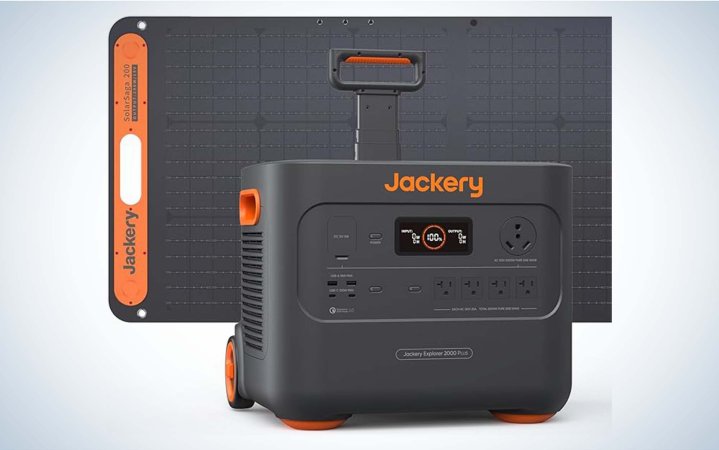We may earn revenue from the products available on this page and participate in affiliate programs. Learn More ›
Dual fuel generators are popular as an emergency home backup power source for good reason. Both propane and gasoline have advantages and disadvantages when it comes to powering your home. Gasoline is inexpensive, efficient, and relatively easy to source, but it produces toxic fumes and has a comparatively short shelf life. Propane, under the right conditions can be stored for years and produces significantly less CO2, but it is less efficient a fuel source than gasoline and may be difficult to source during an emergency scenario. To help you find the right power source to handle your needs, we’ve rounded up some of the best dual fuel generators on the market today.
- Best Overall: DuroMax 15,000 Watt Electric Start Dual Fuel Portable Generator
- Most Portable: EcoFlow Smart Generator
- Best Tri Fuel: Sportsman 4,000-Watt Recoil Start Tri Fuel Portable Generator
- Best Solar Generator: Jackery Solar Generator 2000 Plus
How I Chose the Best Dual Fuel Generators
As a staff writer for Outdoor Life, I’ve spent many hours researching and testing some of the best solar generators and portable power stations. I’m also a long-time camper, and have spent my fair share of time around fuel-powered generators, giving me insight into their advantages and limitations. I’ve researched each of these dual-fuel generators extensively via a combination of first-hand trials, long-term experience with the brand, market research, and real-world consumer reviews.
The Best Dual Fuel Generators: Reviews & Recommendations
Best Overall: DuroMax 15,000 Watt Electric Start Dual Fuel Portable Generator
Pros
- Plenty of power for all your needs
- Surprisingly small footprint
Cons
- Loud
- Heavy
Key Features
- Runs on gasoline and propane
- Other Available Sizes: 2,300 watts to 16,000 watts
- Weight: 380 pounds
If you’re looking for a powerful generator that can handle it all—AC, washer, microwave, freezer—without missing a beat, then you need something big: really big. What sets the DuroMax apart is that in addition to being able to put out 15,000 watts at a time at 120 volts, it can run off of both propane and gasoline, giving you maximum versatility in the event of a power outage. And it manages all that while coming in at a surprisingly small footprint (30 inches x 33 inches x 25 inches). The major downside is that at 83 decibels, this unit is quite loud—imagine standing next to a diesel truck. It may also be overkill for some families that are willing to make do with fewer creature comforts during a power outage and just need something to keep the lights on.
Most Portable: EcoFlow Smart Generator
Pros
- Can be used to recharge EcoFlow’s Delta Pro/Max
- Connects to an app
Cons
- Needs both a separate power station and adaptor cord to maximize functionality
Key Features
- Runs on gasoline and propane
- One size only
- Weight: 62.8 pounds

Most dual-fuel generators only supply power while they are (loudly) running. But pairing a dual-fuel generator with a portable power station can be a smart way to maximize the output of your generator, catching and storing all of the power that it’s generating, so that you can turn the thing off, and still get power while enjoying some peace and quiet. The catch is that to store that power, you’re also going to need one of EcoFlows portable power stations, specifically in their Delta Pro or Delta Max series. (You’ll also need the EcoFlow Delta Pro to Smart Generator Adapter.) EcoFlow estimates that one full tank in their Smart Generator adds 5.4kWh to your portable power station.
Another advantage of the EcoFlow Smart Generator is that, unlike traditional fuel generators, you can control some of it using an app, helping you keep your distance from the noise and fumes.
Best Tri Fuel: Sportsman 4,000-Watt Recoil Start Tri Fuel Portable Generator
Pros
- Runs on more fuel sources than any other choice on this list
- Somewhat affordably priced
Cons
- Connecting to your home’s natural gas can be complicated and expensive
Key Features
- Runs on unleaded gasoline, natural gas, and LPG propane
- Other Available Sizes: 7,500 watts
- Weight: 90 pounds
One of the biggest issues with generators during power outages is finding a compatible fuel source. Gasoline is typically in the highest demand, but with the increase in natural disasters making dual-fuel generators more common, even propane may end up being scarce. To further diversify the fuel sources you can turn to when a blackout strikes, consider a tri-fuel generator. This option from Sportsman runs off of gasoline, LPG propane, and natural gas, a smart choice for individuals that already have a port at home they can run off of. This unit is also light enough for two people to move comfortably up and down stairs, making it more versatile than heavier options.
Read Next: Best Rechargeable Flashlights
Best Solar Generator: Jackery Solar Generator 2000 Plus
Pros
- Virtually silent
- No exhaust fumes
- Recharges via solar power
Cons
- Difficult to recharge in cloudy or dim-light conditions during a blackout
Key Features
- Runs on stored power and solar
- Other Available Sizes: Also available with a 300W, 1000W, or 3000W power station
- Weight: 61.5 pounds

The Jackery Solar Generator 2000 Plus won the award for best for RVs in my review of the best solar generators, and I think that individuals preparing for potential power outages should also consider it. Traditional dual-fuel generators run off of propane and gasoline; if you run out, you’ll have to track down refills from the gas station or similar. That’s not always feasible during a power outage, especially a prolonged one where fuel is in high demand. Solar generators run off of the sun. As long as you have access to clear skies, you can keep it charging. Larger power stations, like the Jackery Explorer 2000 Plus, are capable of handling a high solar input, up to 1400 watts. That means that you can add quite a few panels to your array to really maximize the potential of the sun to power your home. And the larger size of the power station in this case means that you can have power pre-stored in your setup, ready to go as soon as the lights go off.
Of course the catch is that this doesn’t work very well if you live in a gloomier part of the country. But if you live in the sunbelt or another cloud-free zone, a solar generator is a great way to access the free power of the sun whenever you need it.
Things to Consider Before Choosing the Best Dual Fuel Generators
Gas versus Propane versus Natural Gas (versus Solar)
There are pros and cons to every fuel source. Gasoline is readily available and efficient, but you can’t store it for longer than three to six months. Propane is somewhat more difficult to find, but it stores for a lot longer (decades). While it produces less electricity typically than gas, it also produces less CO2.
Read Next: The Best Air Quality Monitors
Natural gas means that you might not ever need to leave your home: if your natural gas line is still working during a power outage, you can just hook it straight up to that. The catch is this typically involves quite a bit of setup and expense, including professional help. Solar power is easy to set up and very satisfying to capture. The catch is that it works significantly less well if the sky is overcast (and not at all if it is night) and most arrays can’t handle enough of a load to consistently run power-hungry appliances like air conditioners.
Fuel Availability
Depending on where you are, it may be easier or more difficult to secure propane or gas. Gas you’d get, unsurprisingly, at a gas station, which can often have long lines with people trying to both fuel their cars and their cans for their home generators. Propane, on the other hand, can be more difficult to find, but there is typically less demand. You can also look for propane swap stations to refuel existing cans.
Weight
Dual fuel generators are typically not good choices for outdoor recreational use, as they are much heavier and more cumbersome to move than single-fuel or solar generators. Before choosing a unit, consider how much you are planning to move it (if at all) and whether its weight aligns with your needs.
FAQs
A dual-fuel generator is worth it if you have concerns about being able to access a supply of fresh gasoline during a blackout. If you live in a part of the country where blackouts are planned (such as California’s rolling blackouts), it’s simple enough to make sure you have enough gasoline on hand before a blackout hits. But if a blackout is unplanned, competition for gasoline can escalate. That can make a dual-fuel generator a smart choice, as it gives you more options for powering your home.
Dual fuel generators do not inherently have longer or shorter run times than single-fuel generators or portable power stations. The length of time they will run for generally depends on what you are trying to run (power-hungry appliances like dryers will sap generators more quickly) and how much fuel you have available to you.
Dual fuel generators will run better during especially dark times of the year, especially if you live in more northern climes. Solar generators, however, are quieter and run cleaner, allowing you to have them in closer proximity to your home. According to the Consumer Product Safety Commission, 85 people die each year from carbon monoxide poisoning related to portable generators, so this is not a small consideration. Choosing a solar generator over a dual-fuel generator could, in some instances, save your life. Solar generators also allow you to recharge your power station without having to restock on propane or gas.
Final Thoughts on the Best Dual Fuel Generators
If concerns about an unexpected blackout have you losing sleep, then it’s time to invest in a generator that gives you options for how you keep the lights on in your home. A dual-fuel generator, like the ones covered here, allows you to store power long-term and power up through gasoline, propane, natural, and energy from the sun.
- Best Overall: DuroMax 15,000 Watt Electric Start Dual Fuel Portable Generator
- Most Portable: EcoFlow Smart Generator
- Best Tri Fuel: Sportsman 4,000-Watt Recoil Start Tri Fuel Portable Generator
- Best Solar Generator: Jackery Solar Generator 2000 Plus
